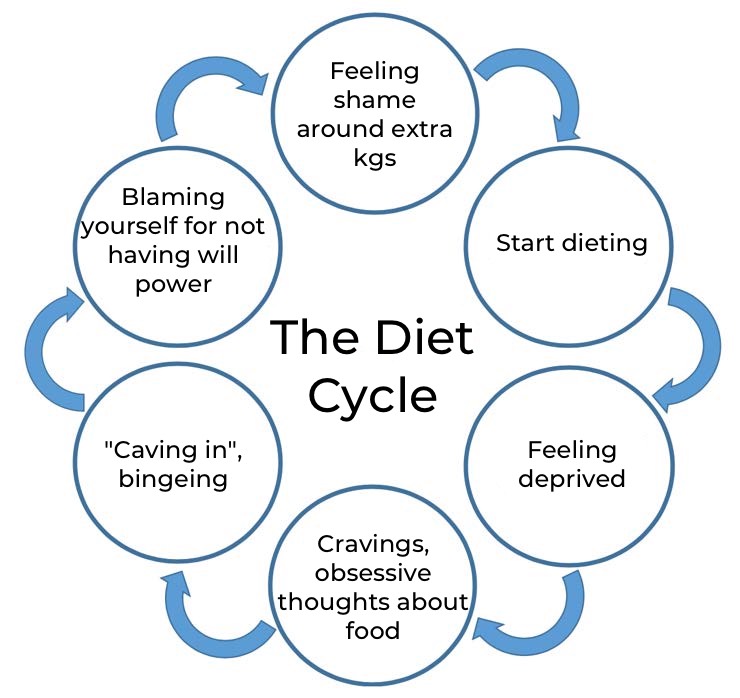If you are reading this blog post, you may be looking for the answer to:
- Why do I binge eat?
- How do I stop?
In this blog post, I will expand on one of the main root causes of binge eating and provide steps to start your healing journey. Let’s start with why.
Why do I binge eat? What fuels the desire to binge?
Binge eating is often fuelled by deprivation: deprivation of calories, nutrients, and often psychological deprivation as well.
Our brain is wired for survival. The reptilian brain, the oldest part, controls survival instincts that were crucial in ancient times. Food restriction and dieting are perceived by the brain as starvation or famine.
These days, we may not need our brain to be on high alert for food, as (in the Western world) we don’t face scarcity and are surrounded by food. But our survival instincts remain active. When we cut back on food, our brain’s survival mechanisms kick in, making us overly fixated on food and leading to obsessive thoughts and a lack of focus.
This is a natural brain response to food restriction. Even if you tell yourself, “There is food. I can eat it later. Right now, I don’t need more food as I am trying to lose a few kilograms,” your brain won’t acknowledge this. Survival mechanisms are much stronger than thoughts.
At some point, when food is within close reach, your brain will scream to have it now. It is here, you must eat it, as there may be scarcity again soon. The brain is protecting your survival like it did millions of years ago and will continue to do so.
This is when you go into a binge, eating uncontrollably everything you can reach. When we limit the intake of food, we also limit the intake of essential nutrients and electrolytes. Our body requires around 30 different micronutrients every day. It’s likely you will crave and binge on high-calorie, high-fat, high-sugar food, as this is the quickest way for the body to replenish the calories and nutrients lacking during the restriction.
Why and When Did the Trend to Restrict Start?
Where have the desire to restrict ourselves is coming from?
The first diet book has been published back in 16th century. The concept of “ideal body types” emerged in the mid-1800s, with beauty becoming increasingly associated with the appearance of one’s body. I recommend reading this article, which goes deeper into the history. It shows how the diet culture with its stigmatisation of body weight and the promotion of food restriction have been supported to maintain systems of power and oppression.
Why Doesn’t Dieting Work Long Term?
Diet culture stands on the illusion of control and blame. The diet gives us an unrealistic promise of losing X kgs and Y cms in Z days if we follow specific instructions. There are many different diets out there – Dukan, Atkins, Keto, low-carb, Not-eating-after-6pm diet, etc. If we don’t achieve the XYZ results, it is our fault for not following the instructions.
But how can one instruction fit every body? Manuals are great for electronic devices, but we are not robots.
Here are a few reasons a diet can’t bring the same results to everyone:
- We all have a genetically predetermined weight set point, similar to eye colour or facial features. Constantly fighting to lower this set point can lead to an ongoing battle with your body.
- Our energy needs vary daily based on activity levels. For women, this is also important as our cycle dictates us to need more calories on certain days.
- Metabolic rates differ from person to person.
- We all have different reactions to food restriction. Some of us will be more sensitive and will develop obsessive thoughts about food, leading to compulsive eating and bingeing.
- Studies have found a genetic link to eating disorders. Some people have a genetic predisposition to develop binge eating, anorexia nervosa, or bulimia. They have higher chances of developing eating disorders if triggered by deprivation, environment, and other psychological reasons.
I hope this list shows how diet is set to fail from the start, and also can be harmful.
Two Major Consequences of Long-term Dieting
I see two major problems with long-term dieting:
One – it hands over the decision-making process for your health to someone else (the Diet, the Instruction). Following the manual only requires one decision – commitment to follow the diet. In reality, long-term commitment to your health and wellbeing requires being in touch with your body and mind, and making small decisions every day. It doesn’t mean you should throw out any structure around food – I will discuss the role of structure later below.
Two – it feeds the self-blame cycle, which adds fuel to the binge eating cycle:

How Do I Stop Binge Eating?
Healing from binge eating requires a holistic approach. Our body and mind have a strong connection; therefore, wellbeing involves taking care of both physical and mental health.
1. Establishing Regular Eating
The first step to breaking this vicious cycle is to stop restricting your eating. Ideally, we want to eat intuitively, which means eating to satisfy our body’s needs every day. However, in people with eating disorders, the connection between body and mind has been broken. Often it is difficult for them to understand when they are hungry or full. A big part of my work with clients is restoring the body-mind connection by cultivating mindfulness. It takes time. Therefore, we focus on hunger and fullness much later in our work together.
Meanwhile, we establish consistent meal intake. I often use Marcia Herrin’s protocol with three consistent meals and two snacks. Consistent eating reduces the chances of bingeing, as your brain’s survival instinct will be calmed down by regular food intake.
2. Getting Rid of the “Prohibited Foods” List
Often, regular eating requires mindset work on ‘legalising’ specific products. For example, if desserts or spaghetti Bolognese have been on your list of prohibited meals because they are high in calories, we will work on allowing yourself to eat these meals during structured mealtimes. This method takes away the scarcity mindset and reduces extra attention around specific products, making them much less attractive as they become a normal part of your meals.
This takes time as often eating “prohibited” products brings anxiety about gaining weight, especially if you have body dysmorphia or unrealistic body image goals. Having the support of a trusted friend, close family member, therapist, or coach is very important if allowing yourself to eat brings anxiety.
3. Cultivating a Self-care Mindset
Being active is essential for our health and wellbeing. Finding what active means for you, what exercises bring you joy, and how they can be part of your everyday life is crucial. This often includes practical changes on how to fit them into your day, and a mindset work.
4. Working on Self-acceptance and Nurturing Our Body Image
This is about bringing feelings of shame to the surface and cultivating self-compassion – being kind to our body, which carries us around every day. This doesn’t mean you can’t have body goals in mind, but accepting what you have right now while working on your goals is important.
Life is happening now, not in the future, when you will be a few kilograms lighter. If you only focus on those extra kilograms now, you are missing out on many moments of joy happening in your life.







